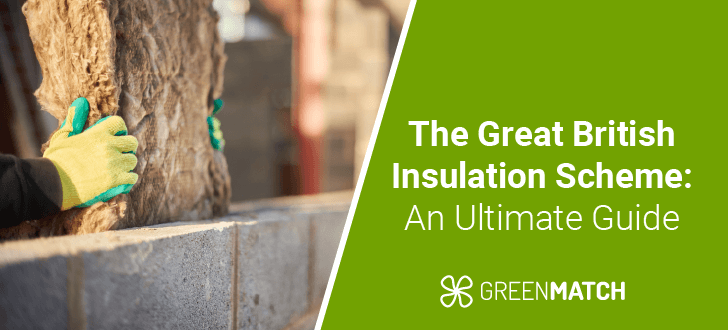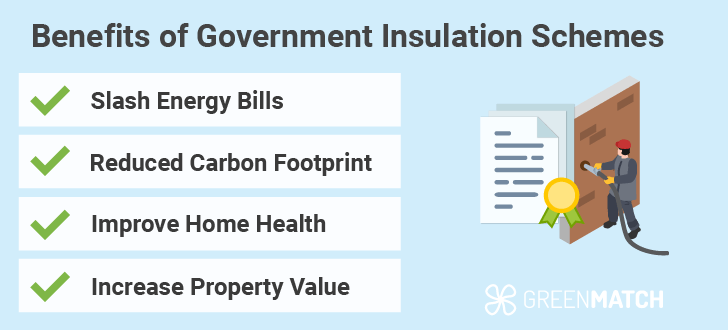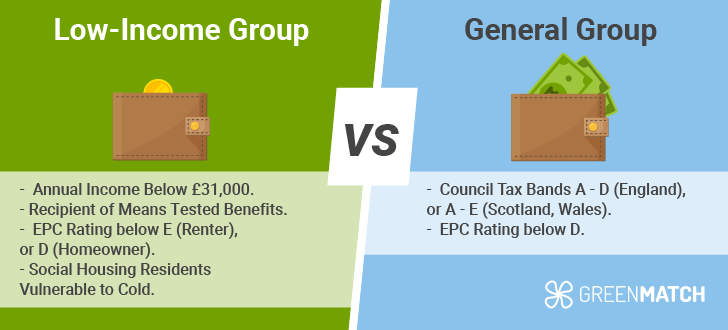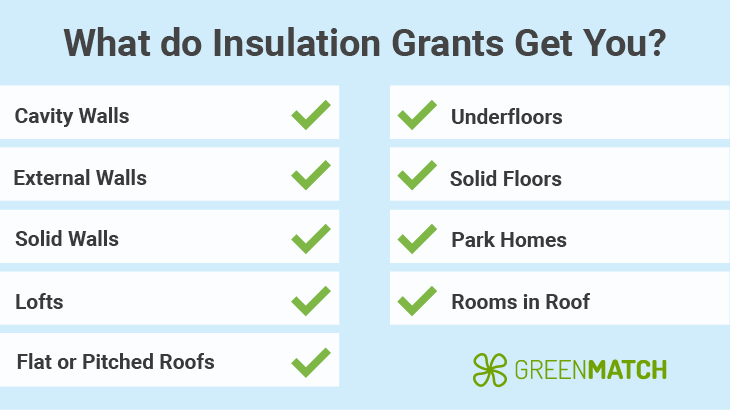Answer these simple questions and we will find you the BEST prices
Which type of solar quotes do you need?
It only takes 30 seconds
100% free with no obligation

Get Free quotes from insulation specialists near you

Save money by comparing quotes and choosing the most competitive offer

The service is 100% free and with no obligation
- GreenMatch
- Insulation
- Insulation Grants
- The Great British Insulation Scheme
Great British Insulation Scheme 2025: A UK Guide


- The Great British Insulation Scheme (GBIS) is a UK government scheme to assist fuel-poor and energy-inefficient households with insulation upgrades.
- Qualifying households can receive free or reduced-cost insulation upgrades.
- The Great British Insulation Scheme (GBIS) is active until March 2026.
With energy costs skyrocketing across the UK, winters are becoming more burdensome as households struggle to keep up with heating costs. Surprisingly, the biggest culprit behind this trend is hardly the cost of energy, but poor home insulation; an all too common reality across the UK.
It’s no secret that the UK housing stock is one of the least energy-efficient in Europe. A study by Construction Carbon claims that all homes built before the 1990s, and up to 75% of homes built before 2010 are considered to have inefficient housing insulation. That’s why the UK government is poised to help fuel-poor and energy-inefficient homes through insulation schemes, namely, the Great British Insulation Scheme (GBIS).
This ultimate guide by GreenMatch UK will guide you through the qualification criteria, application process, and provisions given by the GBIS scheme.
Ready to insulate your home? Let GreenMatch UK free you from the burden of stressful research and vetting. Instead of spending endless hours scouring websites and arranging phone calls with installers, simply fill out our 30-second form and receive up to 3 free home-tailored quotes in return. Free of charges and obligations. Click below to begin!
- Describe your needs
- Get free quotes
- Choose the best offer
It only takes 30 seconds



What is the Great British Insulation Scheme?
The Great British Insulation Scheme (GBIS), formerly called the ECO+, is an energy-efficiency government insulation grant scheme spearheaded by the UK government and administered by the Office of Gas and Electricity Markets (Ofgem).
The scheme is designed to help the UK’s least energy-efficient homes tackle fuel poverty and reduce their carbon footprint by delivering domestic insulation upgrades such as free loft insulation. Qualifying homes are put through a house assessment, from which a decision is made on the most effective insulation measure per household.
Unlike the Energy Company Obligation (ECO4) scheme, the Great British Insulation Scheme provides a single insulation measure per qualifying household. Moat often, these are wall insulation government grants. In contrast, the ECO scheme offers a comprehensive range of energy efficiency upgrades.
To promote domestic energy efficiency in the UK, the government has allocated a staggering budget of £1 billion, set to propel the scheme until March 2026. The Great British Insulation Scheme hopes to bring the UK closer to its ambitious net zero by 2050 target.
From April 2025, it’s expected that the UK will roll out its new Warm Homes Plan, a catch-all scheme aimed at streamlining the funding model and broadening the reach of financial support.
The plan is projected to run for 3 to 5 years and covers two key avenues of support:
- Energy performance: Up to £15,000 per property for energy performance upgrades like insulation, draughtproofing, and glazing.
- Low-carbon heating: Another £15,000 is allocated for low-carbon heating systems, particularly for off-gas homes.
Local authorities will be responsible for administering the grant.
How can you benefit from the government insulation scheme?

Government insulation schemes can benefit your home and livelihood in many ways. Alongside freeing you of the burdensome investment of a home insulation cost, proper insulation brings forth a wealth of perks for you and the environment for years to come. Here are just some to consider:
- Reduced energy bills: Full home insulation can reduce your domestic heat loss by up to 60%, saving you upwards of £650 on your annual energy bills.
- Smaller carbon footprint: Efficiently insulating your home can cut your domestic carbon emissions by up to 1.7 tonnes yearly, contributing to a healthier planet.
- Better home health: Moisture-laden homes breed mould and rot. This harms your home’s structural integrity and also your health by increasing the risk of respiratory illnesses and asthma. Insulated homes maintain a balanced inner climate that protects your well-being.
- Higher property value: An insulated home generally has a better market value. This is due to a higher Energy Performance Certificate (EPC) score that you get through insulation, making your home more attractive to potential buyers and renters.
Who qualifies for the Great British Insulation Scheme?
To receive free insulation from the Great British Insulation Scheme, there are a series of qualification criteria that an applicant must meet. Your eligibility for the grant scheme will depend on these criteria.
This criterion looks at your income, your home's Energy Performance Certificate (EPC) rating, whether you receive government assistance and other markers to indicate whether you require such assistance.
Low-income households

While the Great British Insulation Scheme does not explicitly detail what qualifies as a low-income household, the threshold to qualify as a low-income household is a total gross household income of less than £31,000 a year.
A household's low-income status can also be decided based on its council tax band range. Council tax bands determine how much council tax you pay, based on your property value.
Households within the council tax bands A to D in England, and A to E in Scotland and Wales can qualify for assistance through the Great British Insulation Scheme.
Pensioners and those over 70 can still get free insulation even if they don’t meet the qualification criteria for a grant. Whilst age alone isn’t a qualifying factor, pensioners can receive assistance if they belong to one of two groups; the low-income group, or the general group. These groups can benefit from a range of insulation upgrades, such as free loft insulation for pensioners.
Low-income group:
- Annual gross income below £31,000.
- Home EPC rating of E and below (private renters), or D and below (homeowners).
- Recipients of means-tested benefits (e.g. Pension Credit Savings, Pension Credit Guarantee).
- Social housing residents are vulnerable to cold conditions (age can be a consideration here).
General group:
- Homeowners who live in council tax band A – D in England, or A – E in Scotland and Wales, AND have an EPC rating of D or below.
EPC rating of D or below
The Energy Performance Certificate (EPC) rating measures your home’s energy efficiency. It helps you understand how much energy your home consumes, and its subsequent environmental impact. EPC ratings range from A (most efficient) to G (least efficient).
For the Great British Insulation Scheme, the EPC rating qualification range differs if you own or rent your home:
- Private home renters: EPC rating of D or E.
- Homeowners: EPC rating of D to G.
If you don’t know your home EPC rating, you can arrange an inspection with an accredited housing assessor via the UK government portal. Many professional insulation installers can conduct an EPC assessment of your property.
If you are a homeowner, your property's EPC rating will not be the only qualification that matters. You must also qualify for the correct council tax band ranges as mentioned in the previous section.
Households that receive at least one benefit
Individuals, homeowners and tenants, who receive UK government assistance through allowances and benefit schemes are likely to qualify for assistance from the Great British Insulation Scheme (GBIS).
The current qualifying benefits that are recognised as eligible are as follows:
- Income-based Job Seekers Allowance
- Income-related Employment and Support Allowance (ESA)
- Income Support
- Pension Credit
- Guarantee Credit
- Working Tax Credit
- Child Tax Credit
- Universal Credit
- Housing Benefit
What insulation upgrades does the GBIS scheme get you?

The Great British Insulation Scheme (GBIS) provides home insulation upgrades for qualifying households. Each home undergoes a retrofit assessment by your energy provider. Then, a decision is made on the most effective choice of insulation aimed at improving your home's heat retention and reducing domestic CO2 emissions.
The choice of insulation and funding is usually determined by the energy companies themselves. In some cases, you could receive full coverage by the Great British Insulation Scheme for low and mid-tier upgrades, such as a standard loft insulation grant, but may require a contribution from the household for high-cost measures.
The current range of domestic insulation measures provided by through the grant scheme are:
- Cavity wall insulation grants
- External wall insulation grants
- Solid wall insulation grants (internal and external)
- Loft insulation grants
- Flat or pitched roof insulation grants
- Underfloor insulation grants
- Solid floor insulation grants
- Park home insulation grants
- Room-in-roof insulation grants
Once you are approved for grant assistance, a property inspection will be carried out to determine the best course of action based on your property's needs. Based on the results of this inspection, you can receive assistance, such as government grants for cavity wall insulation.
How to apply for the Great British Insulation Scheme?

To apply for the Great British Insulation Scheme (GBIS), visit the official UK government portal for more information. The GBIS scheme is currently accepting applicants until March 2026, but it is advised to apply as early as possible.
As mentioned, there are a series of energy providers throughout the UK you could work with to administer insulation via the Great British Insulation Scheme (GBIS). Some of these are:
- E.ON Great British Insulation Scheme
- EDF Great British Insulation Scheme
- Octopus Great British Insulation Scheme
- OVO Great British Insulation Scheme
Keep in mind that this is not an exhaustive list and plenty more energy providers are recognised as part of the GBIS scheme and capable of administering insulation upgrades.
The application process is relatively straightforward. Here’s what to expect:
- Check your eligibility
Before submitting the application form on the UK government website, ensure you meet the outlined qualification criteria. The UK government website even has a handy tool to check your general eligibility for the scheme to give you a good idea. This saves you time and ensures you're applying for the right program.
- Apply for the grant
For the Great British Insulation Scheme (GBIS), head over to the official UK government website and fill out the provided online application form to apply. From there, you will be contacted by a scheme representative to discuss the next steps and arrange a property assessment.
- Find a certified installer
To benefit from a grant scheme, it’s required to work with a professional, certified installer who meets the government-set standards in place. This can easily be done by working with an installer who is PAS 2030-2035 accredited. This will also ensure that you receive a high-quality insulation job that will likely last for decades.
- Get multiple quotes
Don't settle for the first installer that crosses your path! For a full picture, get quotes from several PAS 2030-2035 certified installers. That way, you maximise your chances of landing the best deal for your home insulation job.
While it may seem easy, finding the right installer and bargain for your home is no simple task. Prospective customers often find themselves stuck in an endless cycle of researching and vetting installers, without nearing any deal that suits them. That’s where GreenMatch UK comes in to save you the effort.
Instead of spending countless hours behind the computer or waiting on calls from installers, just spend 30 seconds filling out our simple online form and receive up to 3 free home-tailored insulation quotes from installers in our trusted network. That way, you can land the best deal at the most professional quality. The best part? Our services are free of charges and obligations. Click below to begin!
- Describe your needs
- Get free quotes
- Choose the best offer
It only takes 30 seconds



FAQ
Homes that are considered fuel-poor, low-income, or energy-inefficient quality for the Great British Insulation Scheme (GBIS). These can be defined by a series of criteria, such as your annual gross income, home EPC rating, council tax band criteria, or whether you are a recipient of any government benefits and allowances.
The Energy Performance Certificate (EPC) is a rating system that tells you how energy-efficient your property is. Properties are given a rating from A (most efficient) to G (least efficient). Homes with EPC ratings below D generally qualify for the Great British Insulation Scheme (GBIS).
You are eligible to apply for the Great British Insulation Scheme (GBIS) if you meet the necessary qualification criteria. These include factors such as your income, home EPC rating, council tax bands, and government benefits you may receive.
To apply for the Great British Insulation Scheme (GBIS), you can visit the official UK government website and the section relating to the GBIS scheme. You will find an application form there, but can also reach out to the scheme administration through email or phone number.
It’s possible to apply for the GBIS scheme via Octopus! This scheme is available via Octopus for privately rented properties, of which those who meet the eligibility criteria, and permission from their landlord, may apply for the Great British Insulation Scheme (GBIS).

Akif is a copywriter at GreenMatch since 2023. With a keen interest in community sustainability, green solutions and the role of digital media in identifying climate trends, he aims to hone in on his background in International Studies and Digital Media to provide a multidisciplinary approach to written content rooted in credible research and accuracy.
We strive to connect our customers with the right product and supplier. Would you like to be part of GreenMatch?

